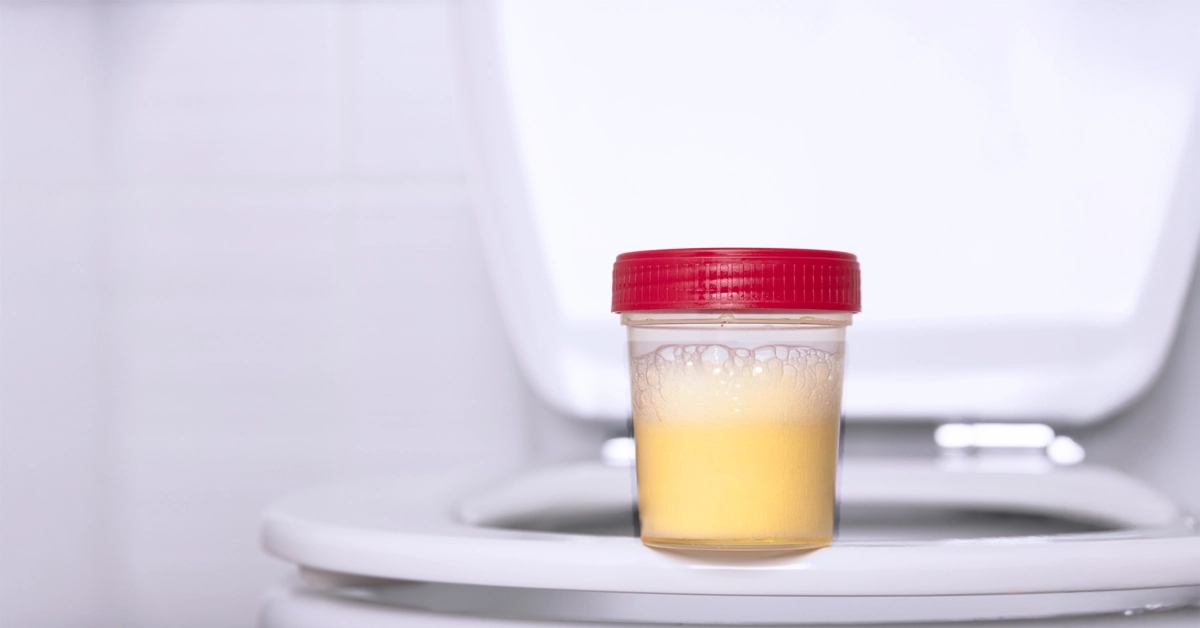Diabetes and Foamy Urine: Causes, Risks, and When to Seek Medical Attention!

Have you ever noticed foam in your urine and wondered what it means?
While it might not seem like a big deal if it’s a one-off occurrence, but persistent foamy urine can sometimes be a sign of an underlying health issue, especially for those with diabetes.
Our bodies are amazing! It often sends signals when something’s not quite right, and it’s important to pay attention to these signs.
Let’s find out why urine may be foamy, what its possible implications are, and when to be concerned.
What Is Foamy Urine?
As the name itself suggests, when you notice bubbles or foam in the urine, it is called foamy or frothy urine. It is more common among individuals with diabetes or/and high blood pressure.
To know your chances of Diabetes reversal, take the Diabetes Reversal TestDiabetes Reversal
Calculator
What Causes Foamy Urine in the Morning?
Foamy urine in the morning can be caused by several factors, and here’s why it might happen:
1. Dehydration
After a full night’s sleep, your body hasn’t had water for hours, which means your urine becomes more concentrated. This can make it foam more than usual.
2. UTIs or Vaginal Infections
Infections in the urinary tract or vaginal area can sometimes cause foamy urine due to the presence of bacteria or discharge.
3. Fever
When you’re running a fever, your body can become dehydrated, leading to concentrated urine that might foam.
4. Holding Urine for Too Long
If you hold your urine in for a long time, when you finally relieve yourself, it might come as a strong stream, creating foam, especially when it hits the toilet water.
5. High Protein Levels
Eating a protein-heavy dinner the night before can cause your urine to be foamier in the morning. This is especially true for people with kidney issues, as the kidneys might not filter protein properly.
6. Prolonged Uncontrolled Diabetes
Long-term high blood sugar from poorly controlled diabetes can damage your kidneys, leading to protein leakage into the urine, which causes foam.
7. Uncontrolled Hypertension
High blood pressure can also harm the kidneys over time, making it harder for them to filter waste properly, leading to foamy urine.
8. Urethral Strictures/Stones
Narrowing or blockage of the urine passage can disrupt flow and cause foamy urine.
If you frequently notice foamy urine in the morning, it’s important to consult your doctor immediately to rule out any kidney problems.
What Is Diabetes-related Foamy Urine?
Your kidneys act like a filter, keeping important proteins in your blood while flushing out waste. But when blood sugar levels stay high for too long, they can damage these filters. If diabetes damages these filters, protein can start leaking into your urine, causing bubbles in the urine. This is referred to as Diabetes Foamy Urine.
Over time, high blood sugar levels can damage the kidneys‘ ability to filter waste and excess fluids, leading to a condition called diabetic nephropathy.
The amount of protein leaking into the urine helps doctors determine how much kidney damage has happened:
- Microalbuminuria (Early Stage) – A small amount of protein leaks into the urine. This is an early warning sign, and with good diabetes control, kidney damage can be slowed down or even stopped.
- Proteinuria (Advanced Stage) – More protein leaks out, and the bubbles in urine become more noticeable. This means the kidneys are struggling more, and the risk of kidney disease increases.
- Nephrotic Syndrome (Severe Stage) – A large amount of protein is lost, causing swelling in the body (especially in the legs and feet). This is a sign of serious kidney trouble and needs urgent medical attention.
If you notice foamy urine along with other symptoms like swelling in your legs or feet or frequent urination, it’s important to check in with your doctor. Catching kidney issues early can help prevent serious complications!
What Are the Risk Factors in Diabetes?
While occasional foamy urine isn’t usually a concern, certain conditions increase the risk of persistent foamy urine:
- Uncontrolled Diabetes – High blood sugar damages kidney filters, allowing protein leakage.
- High Blood Pressure – Can stress the kidneys, leading to proteinuria.
- Kidney Disease – Any condition affecting kidney function can lead to protein in urine.
- Dehydration – Dark, concentrated urine may appear foamy.
- Urinary Tract Infections (UTIs) – Some infections can cause changes in urine consistency.
- Excess Protein Intake – A diet very high in protein can sometimes result in foamy urine.
If you have any of these risk factors and notice persistent foamy urine, consult your doctor. Or simply book a 1-on-1 online consultation with our highly experienced Diabetologist, Dr Vidya. You can even take a second opinion on your diabetes medicines from her.
Diagnosis of Foamy Urine in Diabetes
If foamy urine is frequent, your doctor may suggest tests to check kidney function and rule out other causes.
So, what are the tests for diabetes foamy urine?
There are several tests that can help detect diabetes-related foamy urine, including:
- Urinalysis: Checks for protein, infections, and other abnormalities in the urine. (urine protein greater than 3.5 g per day).
- 24-Hour Urine Test: Measures the amount of protein lost in urine over a full day.
- Albumin-to-Creatinine Ratio (ACR) Test: Detects small amounts of protein in urine to identify early kidney damage.
- Blood Tests (Creatinine & BUN Tests): Evaluate kidney function by measuring waste levels in the blood.
- Glucose & HbA1c Tests: If you have diabetes or high blood sugar, these tests help assess blood sugar control.
- Urine Dipstick Test: A quick test that checks for the presence of protein in your urine, which can cause it to foam.
- Albumin-to-Creatinine Ratio (ACR): This test measures the amount of protein being lost in your urine, which is a key indicator of kidney damage.
- Glomerular Filtration Rate (GFR): This test assesses how well your kidneys are filtering waste from your blood, helping to determine kidney function.
- Kidney Ultrasound or CT Scan: Helps check for structural abnormalities in the kidneys.
- Kidney Biopsy: In cases of suspected severe kidney disease, a small tissue sample may be taken for detailed examination.
If these tests show any abnormalities, your doctor will guide you on further investigation and the best course of treatment.
Treatment of Foamy Urine
If you notice persistent foamy urine, it is essential to seek medical consultation. Treatment depends on the root cause, and only a proper diagnosis can guide the right approach.
Addressing the underlying issue is key to managing this symptom effectively. Here’s how it is typically treated, but please note that only your doctor, after doing a detailed check-up, will confirm this, and your treatment could be totally different from what’s mentioned below:
- Diabetes Management – Controlling blood sugar through diet, medication, and lifestyle changes can help protect kidney health.
- Blood Pressure Control – Managing hypertension with medications and lifestyle changes can reduce kidney strain.
- Hydration – Drinking enough water can help dilute urine and reduce foaminess.
- Reducing Protein Intake – If excessive protein consumption is the cause, your doctor may recommend dietary adjustments.
- Underlying conditions and Medications – If kidney disease is detected, specific medications may help slow its progression.
When to See a Doctor?
If you notice persistent foamy urine, don’t ignore it. Consult your doctor to determine the cause and get the right treatment. Early detection of kidney issues can prevent serious complications!
How We at Fitterfly Can Help You?
At Fitterfly, we believe managing diabetes effectively can help prevent kidney-related complications like foamy urine.
Our team of experts has already helped over 3,00,000 people take control of their health, and we’re here to help you too!
With personalised diabetes care, scientifically designed diet plans, and lifestyle coaching, we ensure you stay on track toward better health.
Join the Fitterfly Diabetes Prime Program or call us on 08068507599; our experts will get back to you so that you take the first step towards a healthier, happier you.
Don’t let issues like foamy urine or proteinuria be a cause of stress – take the right step today!
This blog provides general information for educational and informational purposes only and shouldn't be seen as professional advice.
Frequently Asked Questions
Should I be worried if my pee is foamy?
Occasional foamy urine is usually not a concern and may be due to factors like dehydration or fast urination. However, if it happens frequently or is accompanied by other symptoms, it's best to consult a doctor.
Can diabetes cause protein in urine?
Yes, diabetes can lead to protein in urine (proteinuria) due to kidney damage caused by high blood sugar levels over time.
How to reduce protein in urine diabetes?
Managing blood sugar levels, staying hydrated, eating a balanced diet, and following a doctor's advice on medications can help reduce protein in urine for people with diabetes.
Can protein in urine go back to normal?
Yes, if it’s in the early stages of protein leakage, it can be reversed. The best is to consult your doctor.
Does drinking more water help reduce protein in urine?
Staying well-hydrated can help dilute urine and support kidney function, but if proteinuria is due to an underlying condition, medical treatment is necessary. For people with advanced kidney disease, drinking too much water might actually be harmful, as it can put extra strain on the kidneys. In such cases, doctors may recommend fluid restrictions to prevent further complications. So, while hydration is important, it's essential to work with your doctor to manage the underlying condition causing protein in the urine.
What can I eat to reduce protein in urine?
To help manage protein in urine, it's important to follow a kidney-friendly diet, which typically includes moderate protein intake to avoid putting extra strain on the kidneys while also limiting sodium and potassium (K) in some cases. High-fiber foods, such as fruits, vegetables, and whole grains, are also beneficial for supporting kidney function. For personalised advice based on your specific health needs, it's best to consult with a nutritionist who can provide guidance on the right diet for you.
How much foam in urine is normal?
A small amount of foam in urine occasionally is generally considered normal, especially if it's caused by a strong stream or dehydration. However, if the foam persists or becomes more noticeable, it could be a sign of an underlying issue, such as protein in the urine. Consult with your doctor to rule out any potential concerns.
What stage of kidney disease is foamy urine?
Staging of kidney disease cannot be done on the basis of your foamy urine. Consult your kidney doctor to find out the underlying cause of foamy urine.





















